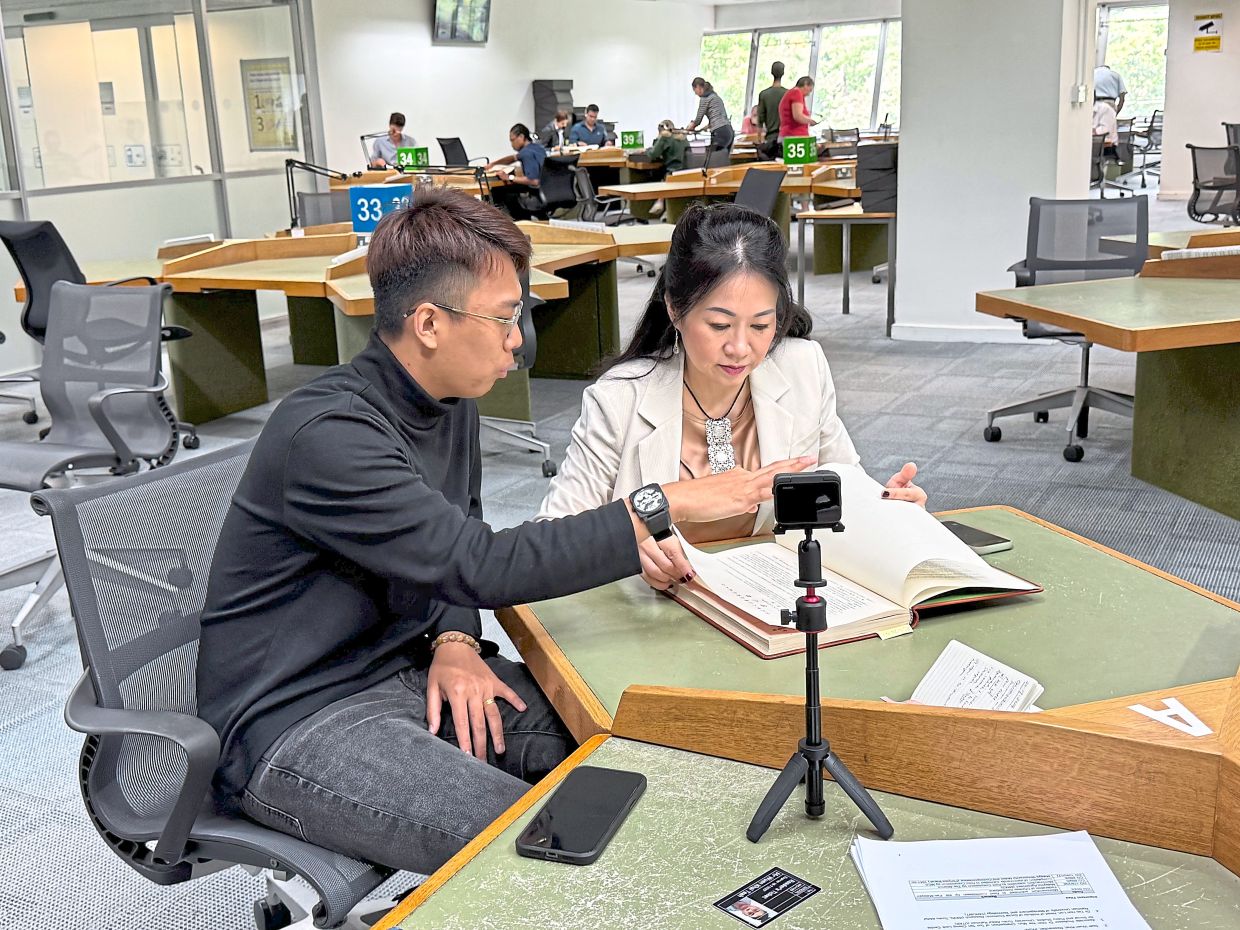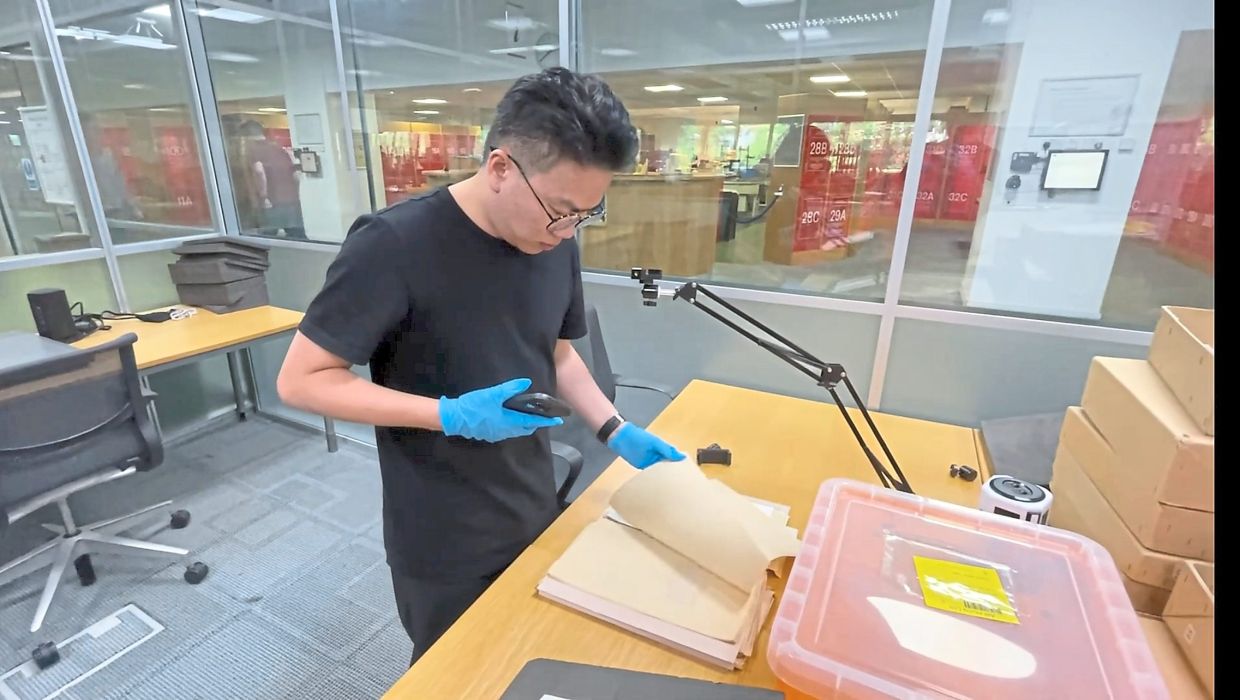Checking the facts: (From left) Yong, Lee, and Chin poring over important finds at the UK’s National Archives. — Photos provided
MORE than 67 years on, the role of the different communities in achieving the country’s independence from Britain, while acknowledged, remains misunderstood.
It is with this in mind that the Institute of Strategic Analysis and Policy Research (Insap) sent four academicians and researchers to the National Archives in London in July. Over 10 days, they pored through hundreds of documents and brought back official copies.
Insap organised the trip to obtain documents that would help clarify the role the Chinese played in Merdeka, specifically to dispel the belief that “the MCA played a passive or minimal role in the negotiations leading to Malaya’s independence”.
Certain narratives over the decades since Merdeka have downplayed the MCA’s strategic contributions and smeared the efforts of leaders like TH Tan in the independence process.
“His pivotal role in the Alliance delegation’s negotiations with the British Colonial Office has often been overlooked or misunderstood. Our research specifically focused on addressing these misunderstandings by revisiting original documents from the British Colonial Office and other records,” says Insap chairman Dr Pamela Yong, who led the mission.
As the other half of the Alliance’s founders, the MCA has endured a long-standing misconception that Tan Sri Mohammed Tahir Tan Tong Hye, or TH Tan as he was better known, had “sold out” the Chinese, who wanted several demands to be included in the fledgling Federal Constitution.
Tan was a journalist and politician who later became secretary of the MCA and served as the first secretary-general of the Alliance Party until 1971. He was part of the Malayan delegation that went to London in 1956 to negotiate for Malaya’s independence. Tan changed his name to Mohamed Tahir in 1972 after converting to Islam.
Tan was also a part of the three-men Umno-MCA Alliance delegation that went to London in 1954 (with Tunku Abdul Rahman Putra al-Haj and Tun Abdul Razak Hussein) to demand for an effective elected majority in the new Federal Legislative Council.
As the story goes, Tan had thrown a memorandum “issued by the MCA and Chinese educational bodies opposing colonial education policy” to the British secretary of state for the colonies, Oliver Lyttelton, into a trash bin in the hotel room he shared with Tunku during the mission.
It was said that Tan was instructed by then MCA president Tun Tan Cheng Lock to submit the memorandum to Lyttelton. But as alleged for the last six decades, Tan decided not to hand over the memorandum during the visit and instead threw it away.
“This allegation of selling out Chinese interests created a controversy that has lasted until today,” says Dr Yap Hon Lun, head of the Institute of Social Economic Research at Tunku Abdul Rahman University of Management and Technology, who was part of Insap’s delegation along with UTAR Tun Tan Cheng Lock Centre for Social and Policy Studies head Dr Chin Yee Mun.
“But there is no evidence that TH Tan was instructed by Tan Cheng Lock to submit the memorandum to Lyttelton; there is also no evidence that any memorandum was submitted to the British during the London trip in 1954. The meeting was only on an informal basis.”
He adds that correspondence records suggest the British were not inclined to discuss other Constitutional matters, making it inappropriate for the MCA to raise communal issues at that time.
There are also no records from 1954 suggesting a significant movement within the Chinese community that tasked the MCA with taking any memorandum to London as the trip aimed only to request that federal elections be held not later than 1954 with a minimum of three-fifths elected majority in the House.
In fact, Insap’s July trip found that in 1956, MCA headquarters submitted a comprehensive compilation of memoranda from various Chinese associations, guilds, and groups, demonstrating MCA’s active participation in the process.
Meanwhile, the memorandum by the Pan-Malayan Federation of Chinese Associations titled ‘‘Confidential Memorandum Submitted to the Reid Constitutional Commission as Reflecting the Views of the Chinese Opinion Generally in the Country”, contained the views and wants of the disparate Chinese society in post-WWII Malaya, gearing up for independence, which would be marked by Tunku’s triumphant “Merdeka” proclamation on Aug 31, 1957.
“Contrary to some misunderstandings, this memorandum is not the one hinted at by Tunku Abdul Rahman in TH Tan’s memoir, as it was not produced by 1954.
“Additionally, we have uncovered the Alliance memorandum submitted to the Reid Commission in 1956. Many of its recommendations were subsequently adopted into the current Federal Constitution,” says Yong.
It is confirmed that the memorandum addressing citizenship, language, and equality was submitted by various Chinese groups in the form of the Pan-Malayan Federation of Chinese Associations in 1956 when the Reid Commission visited Kuala Lumpur.
“Per the archived documents, various Chinese associations submitted their own memorandums through MCA, while that particular memorandum by the Pan-Malayan Federation of Chinese Associations was submitted on their own.”
It was not until a video was uploaded by Cambridge’s St Catharine’s College postgraduate, Tan Chee Yong, who commented on a document he saw in the National Archives, that attention was once again drawn to the prevailing belief that Tan, an important figure in the nation’s founding, had failed the ethnic Chinese community in Malaya.
Chee Yong, having been born and raised in Malaysia, described the myths on St Catharine’s College website:
“This story has been reproduced and recirculated by generation after generation, and the act of throwing the memorandum in the bin has been seen as evidence of TH Tan ‘selling out’ the Chinese community, or even of treason.
“I remember first hearing the story from an elderly gentleman when I was still in primary school. It was laden with resentment and emotion, and I believed what I was told without any doubt.”
More recently, those sentiments were reflected in an opinion piece by former DAP leader Ronnie Liu, published on April 19, 2007, in Malaysiakini. In it, Liu alleged that Tan “threw the entire general demands document into a waste paper basket in a London hotel room instead of bringing it up at the negotiation table”, and wrongly accused the MCA of being traitors.
Yong hopes the trip will begin to help reframe the narrative of the Chinese community’s role in Malaya’s independence, especially highlighting the MCA’s pivotal contributions.
“These negotiations were by no means easy. MCA had to perform a delicate balancing act, pushing for the rights of the Chinese community while aligning with the broader national agenda to present a united front in the demand for independence.
“Many people are unaware or unsure of the critical role MCA played in submitting key memo-randa to the Reid Commission, which helped shape the Federal Constitution.
“These memoranda outlined not only the aspirations of the Chinese community for equal citizenship but also the need to protect cultural and educational institutions,” Yong says.







